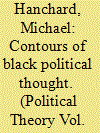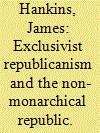|
|
|
Sort Order |
|
|
|
Items / Page
|
|
|
|
|
|
|
| Srl | Item |
| 1 |
ID:
098329


|
|
|
|
|
| Publication |
2010.
|
| Summary/Abstract |
This essay aims to demonstrate how attention to black political thought might expand and complicate our understanding of modern politics and the conceptualization of the political in contemporary political theory, and in modern politics more generally. Black political thought can be viewed as the attempt to develop a set of critical tools to help explain the political distinctiveness of black life-worlds and how this distinctiveness is structured by a series of relations between individual and community, self and other, state and society, citizen and non-citizen, and national and multinational (or global) circumstances. Too often, black politics is exclusively considered as a form of minority group politics and phenomena reducible to empirical investigation and observation, rather than a set of practices with underlying conceptual, theoretical, and epistemological premises. If we understand race as a fundamentally relational concept, namely, an assumption of dynamic interaction between two or more putatively distinct groups, and racism as a political phenomena that is conditioned and articulated through politics, then taken together they provide the opportunity for reflection and consideration of how black peoples and subjects have conceptualized, created and engaged in politics, political communities, and their articulation. Race and racism, the modalities of political participation and, conversely, the modalities of political exclusion have been recurrent themes in black political thought. The distinctiveness of black political thought is symptomatic of the distinctive trajectories of black politics, which first emerged from spaces of exclusion in Western polities and colonies. The histories of black political and social movements provide evidence of the ways in which black subordination in Western societies and polities required the reconfiguration of the actual boundaries between the public and private, the political and the social. Race and racism, the distinction between identity and identification, black solidarities, and the relationship between history, context, and politics and the political are themes central to black political thought.
|
|
|
|
|
|
|
|
|
|
|
|
|
|
|
|
| 2 |
ID:
098330


|
|
|
|
|
| Publication |
2010.
|
| Summary/Abstract |
This essay considers W. E. B. Du Bois's Darkwater (1920) as a window onto Du Bois's political theory at an underexamined stage of his career and onto a challenge at the heart of black political thought: how to formulate a conception of collective life that regards the humanity of black women and men as a central concern. Exploring Du Bois's attempt to articulate what can be seen through the lens of an avowedly "black" perspective and his creative juxtaposition of different modes of writing, the author suggests why Darkwater remains a valuable resource for democratic theory in an age misleadingly described as "post-racial."
|
|
|
|
|
|
|
|
|
|
|
|
|
|
|
|
| 3 |
ID:
098327


|
|
|
|
|
| Publication |
2010.
|
| Summary/Abstract |
The idea that a republic is the only legitimate form of government and that non-elective monarchy and hereditary political privileges are by definition illegitimate is an artifact of late eighteenth century republicanism, though it has roots in the "godly republics" of the seventeenth century. It presupposes understanding a republic (respublica) to be a non-monarchical form of government. The latter definition is a discursive practice that goes back only to the fifteenth century and is not found in Roman or medieval sources. This article explains how the definition emerged in Renaissance Italy.
|
|
|
|
|
|
|
|
|
|
|
|
|
|
|
|
| 4 |
ID:
098328


|
|
|
|
|
| Publication |
2010.
|
| Summary/Abstract |
Polybius' Histories , written in the mid-second century BC, offers an authoritative account of Rome's rise to uncontested imperial supremacy. The work has been highly influential among political thinkers because of its theory of the "mixed constitution." This essay proposes to return Polybius' mixed constitution to its proper location within the narrative of the Histories. This interpretative approach enables us to appreciate Polybius' frequently neglected emphasis on the connections between republican politics and Roman imperial power. These connections shed light on recent developments in republican political theory. They also lead to an investigation of the didactic purposes of the author, who intended to educate the Roman aristocracy in the virtues necessary for exercising hegemonic power successfully in the ancient Mediterranean world.
|
|
|
|
|
|
|
|
|
|
|
|
|
|
|
|
|
|
|
|
|